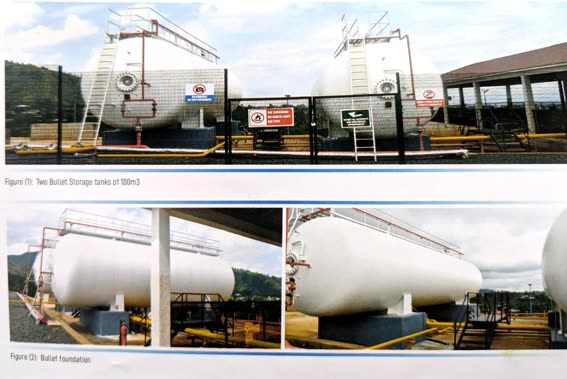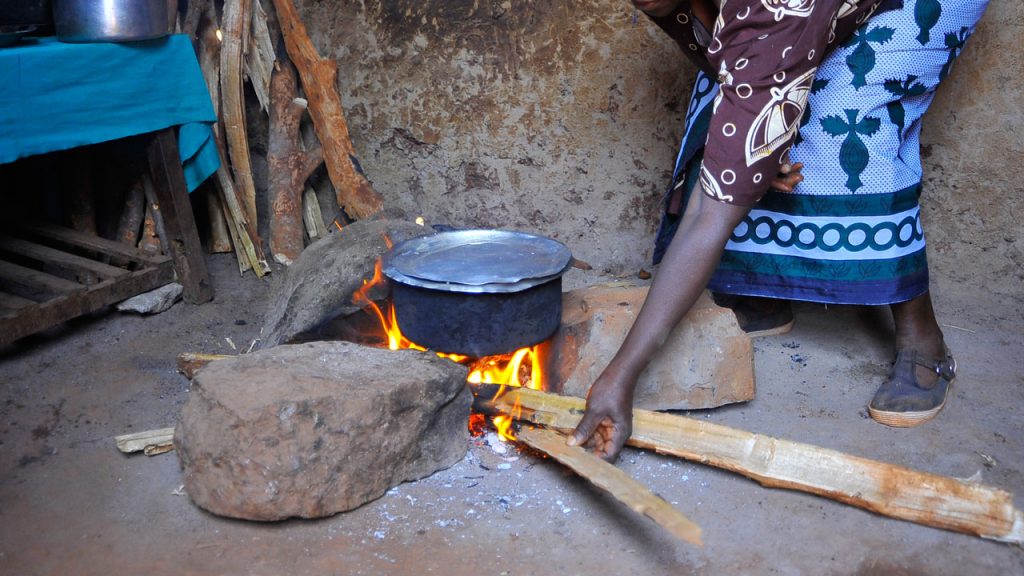Colbert Gwain @The Colbert Factor

A Breath of Fresh Air: Newly Inaugurated Bamendankwe Gas Plant to Bring Relief to Communities Burdened by Fuel Wood
“Over 600,000 women in Africa are killed by toxic firewood fumes every year”, report reveals
Growing up in Muteff village in the Fundong Municipality of Cameroon’s Northwest Region, where firewood was the primary source of energy for cooking and lighting homes after nightfall, made after-school days, Saturdays, and Sundays daunting for us kids. We were compelled to comb nearby bushes and distant forest galleries in search of fuel wood. Having a large bundle of firewood assured one of an evening meal and the assurance of going to school the next morning.

The summer holidays were particularly challenging. Apart from waking up early to clear farms, we had to return each day with firewood, especially the preferred ‘ɨvɨyn’ and ‘ɨlwo’ woods _scientifically known as pygeum and Prunus africanus_greatly loved by our parents for producing less smoke and for their medicinal properties. More firewood was needed during this time to store up for drying corn during the harvesting season.
Children from Muteff village were fortunate that the ‘ɨvɨyn’ and ‘ɨlwo’ woods didn’t come in short supply. In contrast, children from the Bamendankwe community, which excelled in growing mostly smoke-infested eucalyptus trees, used these trees as both fuel wood and a steady source of income. Many families in Bamendankwe used the proceeds to educate their children, who have since become great community leaders.

The constant reliance on firewood as the primary source of energy in both Muteff, in the Boyo Division, and Bamendankwe, in the Mezam Division of Cameroon’s Northwest Region, had far-reaching consequences. Not only did it contribute to environmental degradation and climate change, but it also negatively impacted educational attainment, as children spent more time fetching firewood. In the case of Bamendankwe, this task was further complicated by the need to trek long distances down the Bamenda station hill to the market in downtown Bamenda. Moreover, the reliance on firewood took a significant toll on the health of both children and their families.
With the inauguration of the state-of-the-art liquefied gas plant on the outskirts of Bamendankwe village on May 9, 2025, by Cameroon’s Minister of Water and Energy, Gaston Eloundou Essomba, efficient energy is expected to be piped to all communities in Bamenda and its environs. This marvel, humming quietly to produce clean and affordable energy, marks the end of an era where women and children spent hours collecting firewood, often venturing into treacherous terrain and exposing themselves to danger.
Going forward, households in Bamenda and its environs that previously relied on imported, expensive, and often half-filled gas from neighboring Baffousam in Cameroon’s West Region will be able to cook their meals quickly and easily without the burden of fuel wood. The air, especially in Bamendankwe, is expected to be cleaner, homes safer, and villagers healthier. Women in this community will now have sufficient time to devote themselves to their families, communities, and personal pursuits.
One of the significant benefits of the newly inaugurated Bamenda plant is an improvement in indoor air quality, as villagers will no longer be exposed to toxic fumes and particulate matter from burning wood. This will lead to a drastic reduction in respiratory problems, particularly among children and the elderly. With fewer trees being cut down for fuel wood, the surrounding forests are expected to flourish.
The gas plant, initiated and constructed with funds from the Cameroon Petroleum Products Price Stabilization Fund (CSPH) under the leadership of Okie Johnson Ndoh, is expected to create over 150 direct jobs and 1000 indirect jobs. It will stimulate economic growth in the Bamendankwe community, enabling villagers to pursue other activities such as farming, crafts, and small-scale entrepreneurship.
The story of the newly inaugurated Bamenda gas plant serves as a model for other communities across Cameroon looking to transition away from fuel wood and towards cleaner, more sustainable energy sources. It demonstrates that with new and youthful leadership, careful planning, investment, and community engagement, it is possible to create a better future for all. The gas project has brought more than just energy to the Bamendankwe community; it has brought hope, opportunity, and a breath of fresh air.
Statistics on the health hazards caused by fuelwood cooking are staggering. The very authoritative The Tanzania Times reports that ‘over 600,000 women in Africa are killed by toxic firewood fumes every year’, with Kenya alone recording 26,000 people, mostly women, being killed by the deadly smokes puffing from their traditional kitchens. During a recent East Africa Regional Clean Energy Symposium, in Arusha, Tanzania, the Deputy Director at the Ministry of Energy in Malawi, Thokozani Nelson Malunga, declared that firewood ‘was the silent and rarely mentioned domestic killer, and therefore transition into clean cooking and renewables was of paramount importance.’
Experts at the symposium, The Tanzania Times reports, revealed that women and girls simply go to fetch firewood without realizing that some trees contain poisonous chemicals that when burnt, produce toxic gases which, once enhaled, results in serious health problems, including death. This is besides the ordinary pollution and fire accidents arising from blazing flames in mostly grass thatched huts, with little if any ventilation. Hence, the urgent need to transition away from fuel wood to clean cooking.
Universal access to clean cooking targets 80% adoption by 2030 while Africa’s own milestone is fixed at achieving the 80 percent mark by 2034. So far, Cameroon is way below 10 percent in clean cooking adoption and it is hoped that the government’s recent studies aimed at identifying barriers and facilitating the adoption of cleaner cooking fuels through the Liquefied Petroleum Gas Evaluation (LACE), would fast track the promotion of cleaner energy practices. Fortunately, Cameroon’s Minister of Water and Energy already signaled during the inauguration of the Bamenda gas plant that the government intended to extend the project to local communities across the country.
In the meantime, and for the Bamendankwe community to fully benefit from the newly inaugurated gas station, the gas must be affordable. Although the government has reduced the price to FCFA 6,500 from FCFA 8,500 when gas was imported from neighboring regions, further adjustments may be necessary. Easier access to distribution networks is crucial for the widespread adoption of gas as an alternative to fuel wood.
Another important task for authorities and civil society is to educate communities about the benefits of gas cooking and provide training on the safe usage of domestic gas. Furthermore, strict environmental regulations, safety measures, and sustainable practices should be adopted and implemented urgently to mitigate any potential negative impacts.
In these tumultuous times, communities need access to information that reflects their diverse lives, values, and priorities and is responsive to their feedback. As part of our Trusting News engagement, we are committed to comforting those in need and challenging those who hinder social progress.
However, this endeavor is neither easy nor lucrative. The Colbert Factor is a solution-driven, independent non-profit content creation platform. Serving as a primary source for newspapers, radio and TV stations, online news outlets, and blogs, we maintain our independence from corporate and government interests by not accepting any funding from them.
You can support our mission to produce unbiased, investigative, balanced, fair, reliable, credible, and educational content by donating your A Breath of Fresh Air: Newly Inaugurated Bamendankwe Gas Plant to Bring Relief to Communities Burdened by Fuel Wood
Colbert Gwain @The Colbert Factor
“Over 600,000 women in Africa are killed by toxic firewood fumes every year”, report reveals
Growing up in Muteff village in the Fundong Municipality of Cameroon’s Northwest Region, where firewood was the primary source of energy for cooking and lighting homes after nightfall, made after-school days, Saturdays, and Sundays daunting for us kids. We were compelled to comb nearby bushes and distant forest galleries in search of fuel wood. Having a large bundle of firewood assured one of an evening meal and the assurance of going to school the next morning.
The summer holidays were particularly challenging. Apart from waking up early to clear farms, we had to return each day with firewood, especially the preferred ‘ɨvɨyn’ and ‘ɨlwo’ woods _scientifically known as pygeum and Prunus africanus_greatly loved by our parents for producing less smoke and for their medicinal properties. More firewood was needed during this time to store up for drying corn during the harvesting season.
Children from Muteff village were fortunate that the ‘ɨvɨyn’ and ‘ɨlwo’ woods didn’t come in short supply. In contrast, children from the Bamendankwe community, which excelled in growing mostly smoke-infested eucalyptus trees, used these trees as both fuel wood and a steady source of income. Many families in Bamendankwe used the proceeds to educate their children, who have since become great community leaders.
The constant reliance on firewood as the primary source of energy in both Muteff, in the Boyo Division, and Bamendankwe, in the Mezam Division of Cameroon’s Northwest Region, had far-reaching consequences. Not only did it contribute to environmental degradation and climate change, but it also negatively impacted educational attainment, as children spent more time fetching firewood. In the case of Bamendankwe, this task was further complicated by the need to trek long distances down the Bamenda station hill to the market in downtown Bamenda. Moreover, the reliance on firewood took a significant toll on the health of both children and their families.
With the inauguration of the state-of-the-art liquefied gas plant on the outskirts of Bamendankwe village on May 9, 2025, by Cameroon’s Minister of Water and Energy, Gaston Eloundou Essomba, efficient energy is expected to be piped to all communities in Bamenda and its environs. This marvel, humming quietly to produce clean and affordable energy, marks the end of an era where women and children spent hours collecting firewood, often venturing into treacherous terrain and exposing themselves to danger.
Going forward, households in Bamenda and its environs that previously relied on imported, expensive, and often half-filled gas from neighboring Baffousam in Cameroon’s West Region will be able to cook their meals quickly and easily without the burden of fuel wood. The air, especially in Bamendankwe, is expected to be cleaner, homes safer, and villagers healthier. Women in this community will now have sufficient time to devote themselves to their families, communities, and personal pursuits.
One of the significant benefits of the newly inaugurated Bamenda plant is an improvement in indoor air quality, as villagers will no longer be exposed to toxic fumes and particulate matter from burning wood. This will lead to a drastic reduction in respiratory problems, particularly among children and the elderly. With fewer trees being cut down for fuel wood, the surrounding forests are expected to flourish.
The gas plant, initiated and constructed with funds from the Cameroon Petroleum Products Price Stabilization Fund (CSPH) under the leadership of Okie Johnson Ndoh, is expected to create over 150 direct jobs and 1000 indirect jobs. It will stimulate economic growth in the Bamendankwe community, enabling villagers to pursue other activities such as farming, crafts, and small-scale entrepreneurship.
The story of the newly inaugurated Bamenda gas plant serves as a model for other communities across Cameroon looking to transition away from fuel wood and towards cleaner, more sustainable energy sources. It demonstrates that with new and youthful leadership, careful planning, investment, and community engagement, it is possible to create a better future for all. The gas project has brought more than just energy to the Bamendankwe community; it has brought hope, opportunity, and a breath of fresh air.
Statistics on the health hazards caused by fuelwood cooking are staggering. The very authoritative The Tanzania Times reports that ‘over 600,000 women in Africa are killed by toxic firewood fumes every year’, with Kenya alone recording 26,000 people, mostly women, being killed by the deadly smokes puffing from their traditional kitchens. During a recent East Africa Regional Clean Energy Symposium, in Arusha, Tanzania, the Deputy Director at the Ministry of Energy in Malawi, Thokozani Nelson Malunga, declared that firewood ‘was the silent and rarely mentioned domestic killer, and therefore transition into clean cooking and renewables was of paramount importance.’
Experts at the symposium, The Tanzania Times reports, revealed that women and girls simply go to fetch firewood without realizing that some trees contain poisonous chemicals that when burnt, produce toxic gases which, once enhaled, results in serious health problems, including death. This is besides the ordinary pollution and fire accidents arising from blazing flames in mostly grass thatched huts, with little if any ventilation. Hence, the urgent need to transition away from fuel wood to clean cooking.
Universal access to clean cooking targets 80% adoption by 2030 while Africa’s own milestone is fixed at achieving the 80 percent mark by 2034. So far, Cameroon is way below 10 percent in clean cooking adoption and it is hoped that the government’s recent studies aimed at identifying barriers and facilitating the adoption of cleaner cooking fuels through the Liquefied Petroleum Gas Evaluation (LACE), would fast track the promotion of cleaner energy practices. Fortunately, Cameroon’s Minister of Water and Energy already signaled during the inauguration of the Bamenda gas plant that the government intended to extend the project to local communities across the country.
In the meantime, and for the Bamendankwe community to fully benefit from the newly inaugurated gas station, the gas must be affordable. Although the government has reduced the price to FCFA 6,500 from FCFA 8,500 when gas was imported from neighboring regions, further adjustments may be necessary. Easier access to distribution networks is crucial for the widespread adoption of gas as an alternative to fuel wood.
Another important task for authorities and civil society is to educate communities about the benefits of gas cooking and provide training on the safe usage of domestic gas. Furthermore, strict environmental regulations, safety measures, and sustainable practices should be adopted and implemented urgently to mitigate any potential negative impacts.


